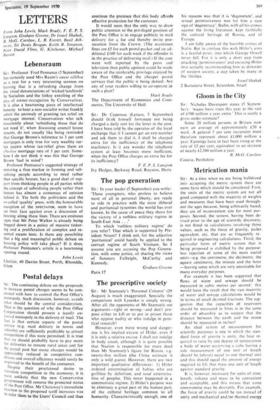Postal delays
Sir: The continuing debate on the proposals to increase postal charges seems to be con- cerned with how to control the Post Office's monopoly. Such discussion, however, avoids what should be the central consideration. That is the question of why the Post Office Corporation should possess a legally en- forced monopoly in the delivery of mail. The fact is that certain aspects of the postal service (e.g. mail delivery in towns and suburbs) are sufficiently profitable to attract competition if this were permitted. It is true that we should probably have to pay more for deliveries to remote rural areas and for the parcel post but many charges would be appreciably reduced in competitive con- ditions and overall efficiency would surely be improved to the benefit of the consumer.
Despite their proclaimed desire to stimulate competition in the economy, it is most unlikely that the new Conservative government will remove the protected status of the Post Office. Mr Chataway's immediate reaction to the proposed tariff increases was to refer them to the Users' Council and thus
continue the pretence that this body affords effective protection for the customer.
It would seem that the only way to draw public attention to the privileged position of the Post Office is to engage publicly in mail delivery for a fee and thereby invite pro- secution from' the Crown. (The maximum fines are for each postal packet and an ad- ditional £100 for each week if the offender is in the practice of delivering mail.) If the case were well reported by the press and television then public opinion could be made aware of the intolerable privilege enjoyed by the Post Office and the cheaper postal services that the public is being denied. Are any of your readers willing to co-operate in such a plan?
Mark Brady The Department of Economics and Com- merce, The University of Hull
Sir: Dr Copeman (Letters, 5 September) should thank himself fortunate not being charged a daily rent for the letter in the post. I have been told by the operator of the local exchange that if I cannot get an STD number and ask them to dial it, I shall be charged extra for the inefficiency of the telephone machinery. Is it any wonder the telephone system at least becomes more inefficient, when the Post Office charges an extra fee for its inefficiency?
F. E. P. S. Langton Ivy Hedges, Barkway Road, Royston, Herts


































 Previous page
Previous page